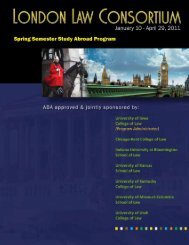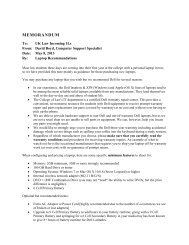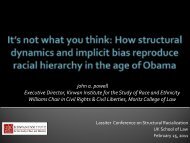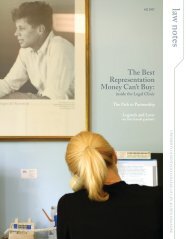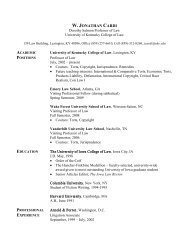law notes - University of Kentucky College of Law
law notes - University of Kentucky College of Law
law notes - University of Kentucky College of Law
Create successful ePaper yourself
Turn your PDF publications into a flip-book with our unique Google optimized e-Paper software.
In 1975, Pr<strong>of</strong>essor Robert<br />
Schwemm began his career<br />
as a <strong>law</strong> pr<strong>of</strong>essor teaching Civil<br />
Procedure I at UK <strong>Law</strong>. With<br />
no prior experience teaching,<br />
Schwemm visited a former Harvard<br />
<strong>Law</strong> pr<strong>of</strong>essor for advice. “He told<br />
me to give as clear an answer as<br />
possible because the subject was<br />
a hard course to teach.” Other<br />
faculty members at UK gave him<br />
substantive advice on how to<br />
approach specific points in the<br />
class.<br />
Schwemm’s biggest concern that<br />
first day was filling the entire class<br />
time. “I did finish class early one<br />
time during my first year,” said<br />
Schwemm. Lesson learned, he has<br />
over prepared material for each<br />
class ever since that day.<br />
Schwemm believes his experience<br />
in litigation helped him in the<br />
classroom. “It helped me get<br />
a sense <strong>of</strong> what was needed to<br />
convince other people,” he said.<br />
He finds that challenge from<br />
students is helpful. Schwemm<br />
looks to his past teachers, as far<br />
back as high school, for models<br />
in his style and approach. “I try to<br />
be demanding, but fair,” he said.<br />
A rigorous teacher, Schwemm lets<br />
a student know when he is disappointed.<br />
“At the same time, I am<br />
complimentary when effort and<br />
quality are shown.”<br />
What surprised Schwemm most was<br />
how many women were in his early<br />
UK classes. When he was a student,<br />
women made up ten percent <strong>of</strong> his<br />
class. As a new teacher, women<br />
made up forty percent <strong>of</strong> the<br />
classes he taught. Many women<br />
were at the top <strong>of</strong> the class. Unlike<br />
his days as a student, Schwemm<br />
found his students to be a very<br />
social group who <strong>of</strong>ten invited him<br />
to gatherings.<br />
Looking back, Schwemm thinks he<br />
should have been more aggressive<br />
in his teaching style or had a better<br />
lesson plan in place that first<br />
year. Regardless <strong>of</strong> his personal<br />
hindsight, the students selected<br />
him for a teaching award his first<br />
year.<br />
“I am aware that only part <strong>of</strong> my<br />
job is to convey substantive information.<br />
A large part is getting<br />
students to engage in the material<br />
so they’re teaching themselves,”<br />
said Schwemm. “Pr<strong>of</strong>essors must<br />
understand that our job is not<br />
to pontificate, but to provide a<br />
connection between students and<br />
material.”<br />
Pr<strong>of</strong>essor Schwemm teaches<br />
Constitutional <strong>Law</strong>, Civil Rights,<br />
and Civil Procedure I and II. •<br />
Pr<strong>of</strong>. Price receives<br />
Ford Foundation<br />
Postdoctoral Award<br />
Pr<strong>of</strong>essor Melynda Price is one <strong>of</strong> 20 recipients<br />
who received a Ford Foundation Diversity<br />
Fellowship Postdoctoral Award. Recipients were<br />
those who have demonstrated superior academic<br />
achievement; are committed to a career in teaching<br />
and research at the college or university level; show<br />
promise <strong>of</strong> future achievement as scholars and<br />
teachers; and are well prepared to use diversity<br />
as a resource for enriching the education <strong>of</strong> all<br />
students. Price will be the first fellow at the Capital<br />
Punishment Center at the <strong>University</strong> <strong>of</strong> Texas<br />
School <strong>of</strong> <strong>Law</strong> for the 2008-2009 academic year.<br />
As a doctoral student at the <strong>University</strong> <strong>of</strong> Michigan,<br />
Price focused on religion and politics. When<br />
Price was considering applying to <strong>law</strong> school,<br />
the state <strong>of</strong> Texas was debating the execution<br />
<strong>of</strong> Karla Faye Tucker. “The debate was an area<br />
<strong>of</strong> <strong>law</strong> where all my interests intersect… human<br />
rights, morality, public opinion, religion and<br />
ultimately what constitutes a citizen,” said Price.<br />
While in Texas, Price will work on a book tentatively<br />
titled, At the Cross: Race, Religion and Citizenship<br />
in the Politics <strong>of</strong> the Death Penalty among<br />
African-Americans. Qualitative and quantitative<br />
methods will be used to study public opinion,<br />
particularly that <strong>of</strong> African Americans, on the<br />
death penalty and how this form <strong>of</strong> punishment<br />
shapes perceptions <strong>of</strong> their inclusion in the larger<br />
political community in post-civil rights America.<br />
Price believes the opportunity to participate<br />
in the day-to-day activities <strong>of</strong> other <strong>law</strong><br />
schools, “… helps us identify where we can<br />
do better and helps us appreciate the good<br />
things about our home institution.” •<br />
celebrating 100 years <strong>of</strong> excellence • Fall 2008 15



